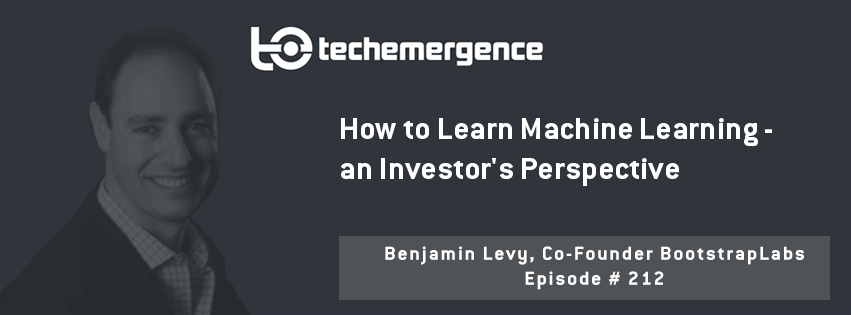How to Learn Machine Learning by Ben Levy
(This article was originally published at techemergence.com)
How to Learn Machine Learning – an Investor’s Perspective
Episode Summary: There’s been lot of hype around AI and ML in business over the past five years. Even among investors exist a lot of misconceptions about using ML in a business context, and how to get up to speed on and learn machine learning as it applies to utility in industry. Recently, I talked with Benjamin Levy of BootstrapLabs in San Francisco, whom I met through an investment banking friend in Boston.
BootstrapLabs invests in Bay area companies, and Levy also travels around the world speaking about investing in AI companies and raising funds for new ventures. In this episode, Levy gives his perspective on what investors and executives get wrong about ML and AI, and discusses how they can get up to speed and leverage the applications for these technologies and related expertise to really make a difference (i.e. increased ROI) in their businesses.
Expertise: Technology; Corporate Development & Strategy; Product Development
Brief Recognition: Ben Levy is the co-founder of BootstrapLabs, a leading venture capital firm, based in Silicon Valley and focused on Applied Artificial Intelligence.
Born in France and living in Silicon Valley for the past 18 years, Ben is a repeat entrepreneur who launched, built, and exited two startups in the financial technology space. Praedea Solutions, a data mining software company using machine learning and image recognition technology, was acquired by Mergent in 2005, and InsideVenture, a financial social network for the founders of venture-backed pre-IPO startups and long-only institutional investors on Wall Street, was acquired by SecondMarket in 2009 (and is now part of NASDAQ).
Earlier in his career, Ben was a Technology, Media, and Telecom Investment Banker who advised startup founders and CxOs of Fortune 500 companies on corporate strategy, financing, and M&A. Ben is also a frequent keynote and panel speaker on innovation, technology investing, entrepreneurship, artificial intelligence, and globalization in the US, Europe, and Asia.
Current Affiliations: Co-founder of BootstrapLabs
Interview Highlights:
The following is a condensed version of the full audio interview, which is available in the above links on TechEmergence’s SoundCloud and iTunes stations.
(1:54) What do you see as some of the bigger misconceptions around machine learning in industry by business people and investors?
Benjamin Levy: We’ve had the benefit of traveling around the world…we talk to executives, family offices, people that are running businesses, and I think there’s been a lot of hype around AI…it’s nothing new, it’s been around about 50 years, there’s been an incredible breakthrough lately, but that’s coming as a result of the explosion of big data, of computing power at scale…
…I think it actually starts with basic lack of understanding of how the technology is going to impact their business…if you’re a business person, at the end of the day, you’re going to be caring about your ROI—is my product better, faster, cheaper; am I selling it to my customers and are my customers happier, and am I competitive. In 2 to 3 years, people will not be selling you AI software, they’ll be selling you upgrades, and that upgrade will have a lot of machine intelligence and a lot of AI, and you’re not going to talk about it because the way you sell AI technology is not going to change…now, the ability that you have as an executive, to have the right talent in-house to evolve your products so that they become smarter…that is the hard part….
(7:20) Talk about the notion (that you mentioned) of “lumpier” in the markets —what do you mean in that regard?
BL: If you look at the global perspective…just from a pure business stand point, we live in a world that is a lot more subject to interconnections and prices impacting one another and the terminal effect, I think in a world where we’re going to continue to see these ups and downs…the waves of disruptions are going to come in faster and faster…if you think about AI, we went from a world where we started to automate to a world that’s becoming more autonomous, a lot more intelligent; so we look at a world that is machine intelligence augmented by human beings…the two combine, but we’re going to move from a world where 80 percent of the work is being done by humans and 20 percent is begin done by machines to a world where 80 percent of the work is done by machines and 20 percent of the work is done by humans…
(10:14) Do you think that people are prepared for the investment involved?
BL: …are you going to be as a business investing heavily in your own capabilities of adopting and applying AI technologies so that you do? Who owns AI inside your company, who owns automation, and who’s going to be driving products that incorporate this other way of looking at things and solving problems?…There’s so many cooks in the kitchen on the inside is side in the corporations; on the other side, you have a lack of vision as to what these products and endpoint should be…
(12:50) What is the talent game for (those outside of Silicon Valley)…what does it look like for the folks who aren’t in the Bay?
BL: …when I think about these dynamics, if you were to be a startup in France focusing on AI, you have a great local pool of talent and you’re not in as much aggressive competition with the local Googles and Facebooks and Amazons of the world that they want to suck up all the talent from these universities, so play that to your advantage. We only invest in companies in Silicon Valley (SV), but the founders can be from anywhere in the world, the company could have ben started elsewhere, which means that we’re completely in favor of you maintaining an R&D somewhere in the place where you come from, where you speak the language, where you know the universities….
(18:35) What do companies do to start to grasp what is possible, see how they could be disrupted, where the opportunities lie?
BL: As a venture capitalist, we’re in a very unique, privileged position…we are educated constantly so we see patterns that are very interesting; my advice would be, talk to people who are in the business to get smarter and wiser, not just by reading things…but you need to talk to people that are on the front lines, who are doing it, you need to potentially be a corporation investing in (venture) funds as well…
…people should be using budgets to actually learn, you should be thinking where can we allocate money…you might actually get closer to people who organize that (sponsored) event and have incredible access, you could be working with incubators and accelerators…there’s a few different tools that corporations have that are accessible to them.
Big Ideas:
1 – People are not buying AI as a company, they’re buying results – a return on investment. AI shouldn’t be looked on as a “neat” thing, but something that has requirements, costs, and results, with a need for smart business decisions, the same as any valuable business tool.
2 – SV doesn’t necessarily have more talent, it just has more resources that allow companies to scale. AI and ML companies can and should get started and grow outside the SV ecosystem. The reason BootstrapLabs wants those companies to eventually have a presence in SV is the ability to scale ideas and ROI; returns are driven by acquisitions, and most of those willing to pay for these technologies are in SV.



